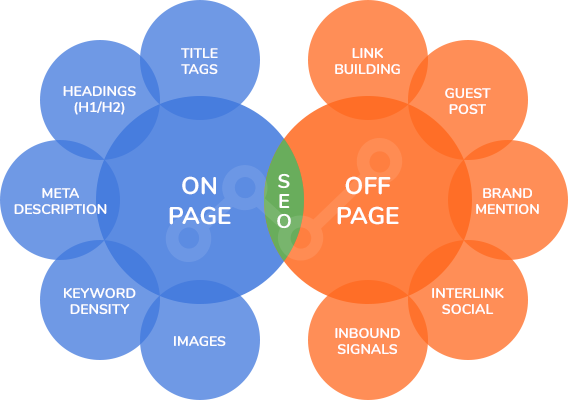One factor remains unchanged in the face of Google’s constant changes and improvements to their search engine algorithm. It’s impossible to oversimplify things when focusing on one dimension. Both on-page and off-page SEO must be addressed in your SEO Company.
Off-page SEO focuses on the domain authority by content development and getting backlinks from other websites. The on-page SEO focuses on optimizing specific parts of your website which are under your control.
To better understand the differences between On-page and Off-page SEO, you have to continue reading below.
Mainly, there are two factors considered by a search engine while evaluating your site.
- On-page SEO- It considers what the page or site is about.
- Off-page SEO- It considers how popular and trustworthy the site is.
On-Page SEO-What Is It?
Consider some of the most fundamental SEO strategies:
- Using keywords in the page title and copy
- The meta description can be optimized to stand out in search engine results pages
- Using alt tags and HTML code
This is the main foundation for on-page SEO.
It refers to all of the steps taken inside the website to increase its search ranking. This makes it easier for search engine bots to understand the page. It also gives the end-users an idea of what they’ll see when they click through from the SERP. It also considers the general quality of the material, the performance of the page, and the composition of the content.
The act of optimising various parts of your website that influence your search engine rankings is known as On-page SEO. Various ranking factors determine the position of your website in the search engine result page. Such factors include page speed, title tags, site accessibility, keywords, optimised content, etc. These are the elements that you can control and bring changes to your website. Few factors impacting your page rank are as follows:
- Website URL Structure– Considering the URL structure is essential, and it can significantly impact the pages later.
- Meta Description– It is the first thing a user looks at when they come across a website.
- Title Tags– The HTML items on your site that tell search engines what title to view in the SERP are known as title tags.
- Content Structure– This is the main things we can think of when we talk about ‘On-page SEO’. It is the way your content appears to the reader.
- Image Alt Text– It appears when the images are not displayed on a particular website.
Off-Page Seo- What Is It?
As already mentioned above, Off-page SEO aims at increasing the domain authority by receiving links from other websites. The number and consistency of backlinks to your website are the most important off-page SEO factors. Given below are some examples of how you can increase the number of links to your website:
- Creating relevant content that the audience will link to because it is functional.
- Links are generated as a result of social media shares of your content.
- Sending outreach e-mails to business influencers that links back to you.
- Guest blogging on websites similar to yours will link back to your website.
The quantity of link is still an essential factor to consider. The SEO company professionals and content creators have also realized that link quality is more vital than quantity. Creating contents that can be shared would be the first step to generate valuable links. It will also help to improve Off-page SEO.
Few factors affecting Off-page SEO are:
- Backlinks– The quantity and quality of backlinks to your site is the most crucial factor.
- Domain Authority– This is the number that your site receives from search engines to determine how strong your site is.
- Social Promotion– Social posts that get the maximum number of clicks helps to boost the traffic to the website.
The number of links you need for an excellent Off-page SEO is challenging to decide. This depends on the domain authority of the competitors. You must make sure that you are playing on the same level. SEOs used to think that purchasing links was a legitimate way of generating links. However, Google will now penalize you if an attempt is made to manipulate the page rank by buying links.
You can be penalized if you try to submit your links to the link directories to boost your domain authority. As far as link building is concerned, quality always win over quantity.
On-Page Or Off-Page SEO: Which One Is Important?
Choosing between off-page and on-page SEO hardly matters. It is almost like choosing between a roof and a foundation for your house. On-page and off-page SEO both help to boost your page rank in a complementary manner. However, SEO company professionals recommend that you get your On-page SEO positioned well before focusing on off-page SEO.
Think of the situation as building a house. You have to set the foundation first before you start building the house. You need to revisit your On-page SEO from time to time for maintenance, much as you would for the foundation of your home.
By balancing the two, you’ll be able to make your website “bilingual”. It will ensure that both your customers and search engine machines can understand it. This, again, will help to boost your rankings.
So, it would be best to say that both are equally important to gain a good ranking. There might be some differences between On-page and off-page SEO. But a great SEO strategy takes both of them into consideration.

